Cullens Costcutter, Cavan
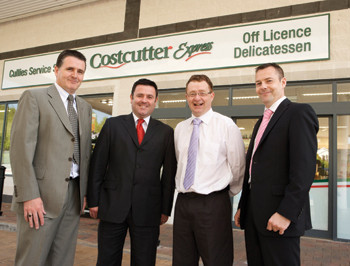
Now returned to Cavan town after a spell away and installed in his brand new Costcutter, Thurles-born JIM BOURKE may not be a native of his chosen home but this hasn’t stopped him becoming one of the locals...
26 August 2008
Cullies’, as it is known locally, is in fact Jim Bourke’s third Costcutter store. From a background in hospitality and hotel management Jim moved into retail in 2002, when he leased his first forecourt in Cavan town, where the Thurles man has been domiciled for some time. He ran Enright’s Costcutter for four years and nine months until the site owner decided to sell, but undeterred Jim and his wife swiftly found another place, buying the Maxol Costsutter in Lanesborough in 2006.
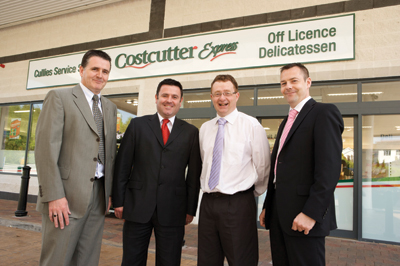
L–R: Ger Heffernan, store developer, Noel Brady, field sales manager, Jim Burke, owner, and Mark McCumiskey, account manager
According to Jim, they were quite satisfied with everything at the at the Longford site, accept for missing life in Cavan that is. Although neither Jim nor his wife were originally from the place, it had come to be home and they couldn’t wait to get back. “So then we heard about this shop here” said Jim, “We were living in Cavan so long we’ve a lot of contacts here. So we applied for it and we had a very good reputation from before” – Enright’s under Jim’s charge turned about €55,000 net per week – “It was a very good shop and it was very well run so we had a good reputation”. Then Jim Bourke met with builder and owner Jim McGahern and the rest is history.
A forecourt with forethought
Previous owner Mick Clarke’s petrol station formerly sat alone on the site of the new Maxol Costcutter. “He was here for about thirty years, Mick Clarke, and did really well. He must have been doing about a million and half litres a year here”. The Cullies site was then purchased by “local boy” Jim McGahern who went on to build a brand new service station and 2,000 sq ft retail space, 2,400 sq ft including the attractive segregated seating area. “Jim McGahern as a builder is at the high end of the spec” remarks Norman Linehan. “You can see when you walk around the forecourt out there, he’s fitted in stuff for two years down the road,” he says referring to the tracks already laid for the impending new brush wash, and the tanks for the biofuel already in place. “His attitude was do it now and get it right first time”.
So the site has remained in good hands it seems. Obviously the Cavan bypass doesn’t pose much of a threat to the service station on what was once the main road to Monaghan? “No. One of the attractions of the site was the fact that is was still doing the million and half litres a year even after the bypass was built,” explains Jim, which is thanks mainly to the lack of competition. “From here to Clones there’s no petrol except us” he tells me.
Demand abound
In terms of customers the c-store is sitting pretty too. “There’s around 600 houses around the corner,” says Jim, “The third level college is just there behind us which fills us up especially at lunch time. Then we have St Pat’s College (local secondary) just there behind us with 600 students”, to name but a few local sources. Jim Bourke’s Costcutter also has the advantage of being the first shop of its kind in the area. “The amount of people who came into us the day we opened saying isn’t it just brilliant to have a shop. They couldn’t get over having a shop at last.”
Remarking on the unprecedented success of Burke’s new store Norman Lenihan adds, “As I was saying earlier on, when you open in a new green field site you’d expect things to start off slower, maybe in a week or two (from opening) but here it was straight away.”
“We actually couldn’t keep them out” says Jim, “Thursday morning when we came to open we had an issue with the pumps – there’s always something that’ll give you an issue – and we couldn’t open ‘til we had it right, but we couldn’t keep them out. Which is great, we weren’t complaining”.
The business of food
Norman informs me that the shop is yet to have its official opening “We normally leave shops open about four to six weeks before doing the opening,” after which marketing in the area will begin, including leaflet drops and menus to drive Jim’s food business. Jim is very excited about the potential of the specially constructed seating area to the rear of his store and plans eventually to serve a carvery offering there. It is highly probable that he will also develop a catering offer to tap into the substantial office-based customer pool in the locality, although he has no intention of rushing into anything. “It’s one step at a time but we will do that kind of stuff, there’s good money in it if you do right. Food is all about volume”
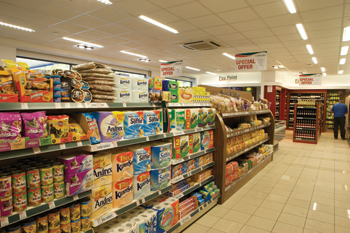
Being the only shop in the area, grocery is a key offering
Being the only shop in the area, grocery is necessarily a very important part of Jim Bourke’s offering. “I wanted to have a good grocery offering because of the number of houses around here. I wanted to be carrying enough so that people coming in know I’m going to have Maxwell House Mild and Strong. They know I’m going to have eight different kinds of soup not two. The range that we’ve put out there would be double what we’d put into a store like this ordinarily,” Norman affirms.
Like many retailers Jim has realised the value of the off-licence to the business, with wine in particular moving rapidly from the shelves “We fill it up and in no time it’s gone”. Category management has played a big role in the success of this area, according to Jim. “Wine is moving very well because we put in the top sellers. We’ve taken out all the rubbish – we never put it in in the first place”.
All in all Jim is happy with the performance of each department, as he is with each aspect of his business. “We have found that mix of business and that’s where we want to be. We’re not here waiting every evening at 5 o’clock for people to come in. The car wash is going very well for us, because you’ve the space to pull up and get your car washed,” he adds eagerly. As Cullies Costcutter is open from seven in the morning to 11pm at night each day, it seems it has the ability to be busy most of that time.
Keeping it local
What better testament to your likeability as an employer or as a member of the local community than old staff coming back to you on your return from being away? “Every single person from the last shop applied for here” Jim tells me proudly. He is rightly proud given the effort he puts in with his staff, from which he also reaps the benefits. “I’m here seven days but I don’t open and I don’t close. They’re hanging around waiting on me. I have a key to the shop but I should never have to use it”. Norman acknowledges that it is lucky to have staff you can count on “It makes a big difference that you had the staff from previous stores,” Norman remarks, “The opening was one of the easiest openings you ever saw”.
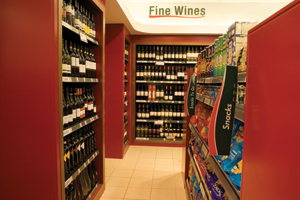
"Wine is moving well because we put in the top sellers"
Undoubtedly there was an attraction also to working in the bright, brand new shop. Norman Linehan runs me through the finer details of the new Costcutter design rolled out for the very first time in Cullies’. New colour scheme, new elegant wood-finished shelving and granite work tops, impactful new signage, new lighting and of course, energy-efficient technology. “You have to,” says Norman, referring to the level of effort and detail that went into Jim’s new store. “In fairness this was a great site for us as well. This site will get us two to three more shops, that’s the way it works”. Costcutter aims for the quality rather than quantity Norman explains, “I would prefer to have this site here than two doing half the turnover. We target areas and retailers, the retailer is as important as the location”.
In addition to getting the store elements right, the winning formula is completed by the right person at the helm. “These kind of shops are going to survive, with any reasonable retailer in them who gets involved with the community, that stands in the shop themselves and talks to the customer that comes in the door” says Jim Bourke. Simple things like giving a child an ice cream, buying a gift for a new baby. “How much does an ad cost you? Or a thousand flyers? If you go to a funeral or the wake of someone local, you bring food with you and you put it in the Costcutter box. That’s how these shops are going to survive. Being part of the community”.



 Print
Print
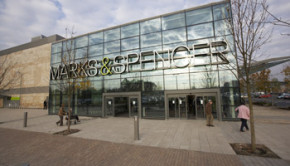





Fans 0
Followers